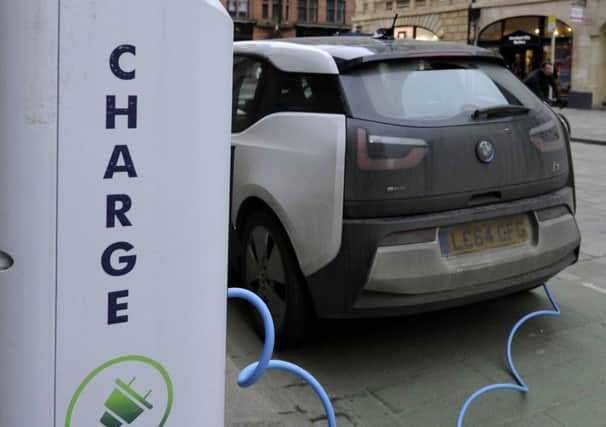Brian Monteith: Is Michael Gove aiming to join the Green Blob?


Now I fear Gove has done it again, I’m beginning to think he has gone native at the Department of the Environment, Food and Rural Affairs.
Last week he made an important speech, and in general terms a good one, but he included in it a statement that the UK Government was intent on banning the sale of all cars with an internal combustion engine from 2040. That’s right, no diesel or petrol cars, no hybrids even – just electric cars, full stop.
Advertisement
Hide AdAdvertisement
Hide AdI remember the days when Gove as a Times columnist appeared to be the only London-based commentator to understand the problem with the Scottish Parliament was that because it did not raise most of the money itself, it felt happy to spend to the hilt. With sadness I noticed that once in government he seemed to abandon that fiscally sound approach to Holyrood.
I admired Gove for his tackling of England’s education blob; the task needed a radical to challenge the complacent establishment that had put egalitarian theory before results – and my hopes were encouraged. But then came his role as a leader of the Vote Leave referendum campaign in claiming the EU was costing us £350 million a week and it could be better spent on the NHS.
At strategy meetings economists such as Ruth Lea and other campaigners including myself pointed out this was the gross figure and a net figure of £200m a week was sufficiently impressive but also completely robust. Sadly, Gove, Boris & Co chose to plough on regardless with the misleading figure, and have been forced to spend time and energy defending it ever since.
When he made the greatest error of his career by deciding to stand for the Tory leadership (taking out both himself and Boris Johnson in the process), my heart sank again.
He has since recognised his mistake so I rejoiced at Theresa May bringing him back into the Cabinet as Environment Secretary. Now, I thought, there would be somebody with the intellectual capacity and revolutionary commitment to take on the Green Blob – bringing back some balance to the climate change debate and challenging the many unnecessary regulations and costs that British industry has been saddled with.
He might recognise the aggregates levy has had the opposite effect on the environment to that intended, by driving up road miles of exempted materials, increasing the amount of spoil from the aggregates sector and stimulating illegal quarrying.
He might recognise that many of the claims of environmental campaigners about the benefits of renewable generation or the dangers of fracking have been grossly exaggerated.
But after his speech about banning cars that are not electric I again have my doubts.
Advertisement
Hide AdAdvertisement
Hide AdIt is not that I am against electric cars, I am in favour of the private sector furthering their development and can see obvious benefits, especially for reducing pollution in urban areas. That said, I don’t believe Gove can have thought this policy through – it is going to cost billions to make the change and the practicalities are so immense that it will require huge upheaval to our infrastructure and the way our cities work. Surely hybrids offer a compromise? Calculations by the Scientific Alliance put the cost to the Exchequer – in other words the taxpayer – of switching to electric-only cars at £912.50 per car per year, or more than half a trillion pounds over the average 14-year life of all 32m cars unless current subsidies are abolished and new taxes introduced.
Scientific Alliance points out that each electric car already carries a subsidy of some £4,500 and that, with no liability for petroleum fuel duty, electric cars will only pay 5 per cent VAT on their electric supply. If electricity was to be taxed more, there would have to be different rates from the household supply to ensure non-drivers don’t subsidise car owners – or taxes on cars would need to increase dramatically.
A Scottish tenement has, typically, space for three cars on the street but an average of nine flats, with a likelihood of at least six car owners – so where will the cars charge overnight? Petrol stations can refill a car with fuel in five to eight minutes but recharging a car can take hours. Will we need multi-storey car parks with charging points built?
Then there are the questions on how the National Grid will cope with the demands on drawing-down power and how it will generate the electricity to distribute. Scientific Alliance calculates 32m cars will need an additional 70 flexible power stations the size of Cockenzie producing an extra 85,000 megawatts.
Renewables cannot supply the gargantuan amount required. Are electric cars Gove’s cunning plan to encourage new nuclear generators or develop fracking for gas-fuelled power stations? Simply relying on “batteries will get better” cannot be an acceptable answer.
So why this bald and provocative statement? While Gove has got people talking and thinking of what can be done to facilitate a change to electric cars, I suspect the reason is that he is looking to reinvent himself and the Conservative Party.
Both desperately need to appeal to the younger, environmentally conscious voters that pick up their news from social media – and his statement clicked through. In short, Gove is grandstanding to change perceptions by redefining the Tory party as a fully paid-up member of the Green Blob.
I hope I’m wrong, but I’ve been let down too often to believe I am.